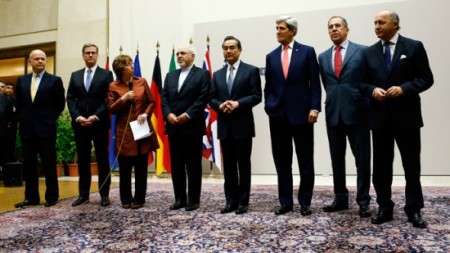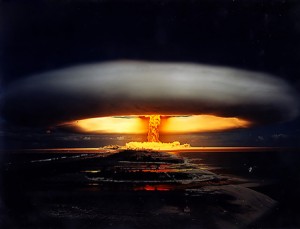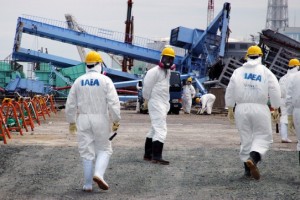
The Iran Nuclear Agreement & Congress’s Role
 The dangers of nuclear weapons programs span a spectrum of catastrophe: from a meltdown at a nuclear reactor, to a state detonating a nuclear weapon, to terrorists setting off a dirty bomb. The paradox of the security and insecurity that nuclear weapons concurrently provide has yet to be reconciled, but for now, the U.S. must provide direct aid to the international institution responsible for maintaining the peaceful use of nuclear science and technology; the International Atomic Energy Agency (IAEA).
The dangers of nuclear weapons programs span a spectrum of catastrophe: from a meltdown at a nuclear reactor, to a state detonating a nuclear weapon, to terrorists setting off a dirty bomb. The paradox of the security and insecurity that nuclear weapons concurrently provide has yet to be reconciled, but for now, the U.S. must provide direct aid to the international institution responsible for maintaining the peaceful use of nuclear science and technology; the International Atomic Energy Agency (IAEA).
On September 27, 2013, President Barack Obama and Iranian President Hassan Rouhani spoke on the telephone, thus ending the embargo on direct contact between their two offices since the Iranian revolution of 1979. After months of arduous negotiations following that phone call, the Joint Comprehensive Plan of Action (JCPOA) was signed on July 14, 2015, and so long as it remains enforced, a compliant Iran will not become a nuclear weapons state.
To reach this agreement, the Obama administration negotiated with Iran strictly on the nuclear issue—a known state-sponsor of terrorism—because Iran becoming a nuclear weapons state would precipitate calamity in the Middle East. The United States has not recklessly abandoned its national security interests to secure an agreement with a foe; nuclear weapons are simply the direst threat to security in the region. This agreement does not mean that the U.S. will ignore the three incarcerated U.S. citizens being held in Iran or Iran’s support of Hezbollah, Hamas, and Iraqi Shiite militias. Far from hindering the U.S.’s ability to act on these crimes, the JCPOA allows the U.S. to focus on them now that Iran’s nuclear capability has been capped.
On September 10, 2015, President Obama was assured that he would not have to veto Senate disapproval of the Iran nuclear agreement when the Senate did not have the required support to move to a vote; 60 votes are required to move to a vote, and the movement fell short 58 to 42.
Congress must now efficiently implement the JCPOA, so that all of the negotiations do not dissolve into increased tensions and even less trust than prior to the historic phone call. One of the greatest concerns is guaranteeing that Iran does not cheat clandestinely or through minor transgressions. To do this, direct aid must be given to the IAEA which is charged with monitoring Iran’s nuclear program.
 On August 25, 2015, Yukiya Amano, Director General of the IAEA, requested $10.6 million per year from the United Nation’s Board of Governors to implement the JCPOA in Iran. Before the negotiations began, it cost the IAEA about $14 million per year to monitor Iran. During the Interim Deal it cost about $26 million, and the Bipartisan Policy Center is estimating that it will cost the IAEA closer to $50 million per year to monitor Iran. Congress should play an active role in ensuring that the IAEA has the funds and the authority to adequately implement the JCPOA by delegating more funding to the IAEA in the annual budget.
On August 25, 2015, Yukiya Amano, Director General of the IAEA, requested $10.6 million per year from the United Nation’s Board of Governors to implement the JCPOA in Iran. Before the negotiations began, it cost the IAEA about $14 million per year to monitor Iran. During the Interim Deal it cost about $26 million, and the Bipartisan Policy Center is estimating that it will cost the IAEA closer to $50 million per year to monitor Iran. Congress should play an active role in ensuring that the IAEA has the funds and the authority to adequately implement the JCPOA by delegating more funding to the IAEA in the annual budget.
Director General Amano also highlighted that the IAEA’s Regular Budget for 2016 could not fund the implementation of the JCPOA, and the Extra-Budgetary Resources would be “exhausted” by the end of September. He quoted the estimated funds needed for implementation at $184,000 per month, which considering the IAEA’s annual budget of close to $390 million is a very small amount.
Congress should pass a bill to allocate that money to the IAEA to not only ensure the national security of the U.S., but also to show that the U.S. can put partisan politics aside to encourage global security. As an example, on December 27, 2007, Republican President George Bush signed into law funding allocated for a nuclear fuel bank run by the IAEA, and a similar bill could be drafted to ensure that the IAEA can adequately monitor Iran’s nuclear program in the short term.
No matter your opinion of the JCPOA’s merits, neglecting the financial needs of the IAEA threatens U.S. national security and gifts Iran a weakened nuclear watchdog, and thus less incentive to refrain from attempting to clandestinely violate the nuclear agreement.





